March 28, 2025 – Day 40 of the 100-Day Dharma Talk, Friday Dharma Q&A
Hello everyone. Today marks the 40th day since we began the 100-Day Dharma Talk. It seems like just yesterday we reached the 30th day, and now we’ve already passed the 40th day. The weather is gradually becoming warmer. In Seoul, forsythias, azaleas, magnolias, and apricot blossoms have begun to bloom in various places.


After completing his morning practice and meditation, Sunim headed to the Jungto Social and Cultural Center to give his Friday Dharma Q&A lecture. Volunteers had arrived early in the morning to welcome citizens who came to attend the Dharma Q&A.


At 10:15 AM, with about 120 people in attendance, the Friday Dharma Q&A lecture began with the recitation of the Three Refuges and Words for Practice. Approximately 3,600 people were connected to the YouTube live broadcast.

Large forest fires in the northern region of North Gyeongsang Province and the Sancheong area of South Gyeongsang Province have caused significant damage. Sunim began his lecture by acknowledging the affected local residents and expressing gratitude for the firefighters who are dedicating themselves to extinguishing the fires.
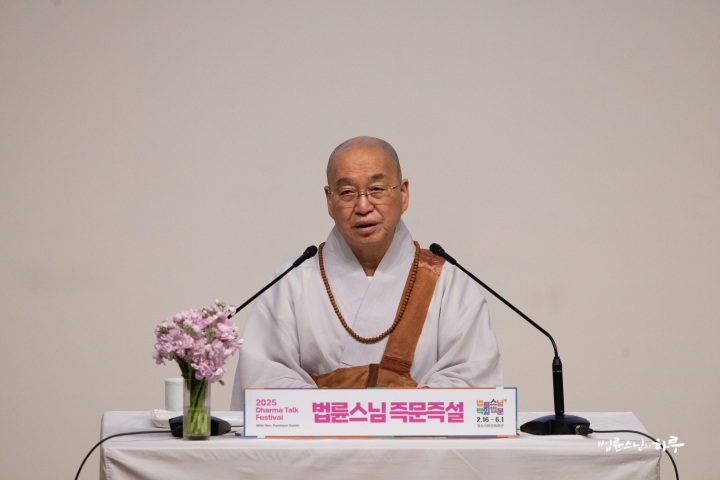
“Large forest fires in the northern region of North Gyeongsang Province and the Sancheong area of South Gyeongsang Province have caused significant damage. When a major forest fire occurred in Los Angeles, USA, in January, it felt like an incident in a distant country, but now it has become an event happening close to us. Until now, there have been cases of large forest fires in various parts of the world, such as Siberia, Australia, and California, but it was rare for these fires to engulf residential areas, burning thousands or tens of thousands of homes. However, in LA, more than 10,000 homes were recently destroyed by fire. In our country, this forest fire has burned thousands of homes and tragically claimed more than 20 lives.
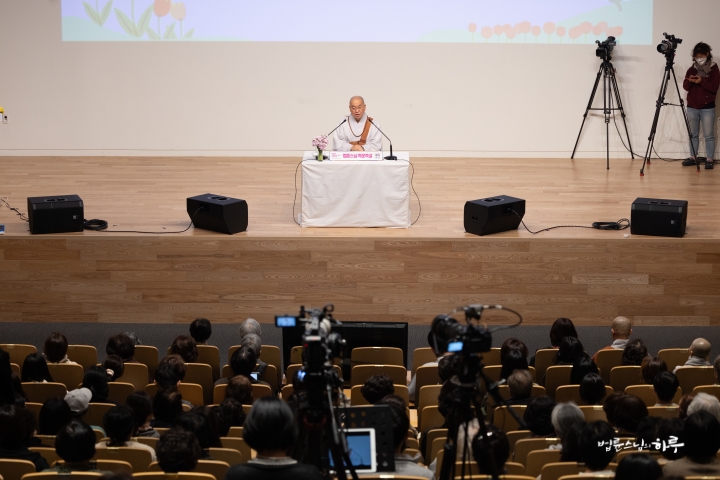
These natural disasters are not naturally occurring but are the result of our ignorance about the natural environment. Humanity has established a culture of mass production and mass consumption by pursuing only convenience, and this has become a major cause of natural disasters. The current natural disasters can be seen as a kind of karmic consequence of human civilization.
Praying for the Speedy Recovery of the Affected Areas and the Stability of Residents’ Lives
What we need now is, first, to stand with the fire victims with warm hearts. Second, to actively provide support when needed. Third, to take preventive measures to ensure this doesn’t happen again. Fourth, to change our consumer culture for a fundamental solution. We must reduce unnecessary consumption and stop overconsumption. Otherwise, it will be difficult to overcome the climate crisis.” “When the Paris Climate Agreement was reached at the United Nations in 2015, countries agreed to prevent the global temperature from rising more than 1.5 degrees Celsius compared to pre-industrial levels.
However, recent reports suggest that last year, the Earth’s temperature rose by 1.55 degrees Celsius, exceeding the critical threshold. Some argue that these changes in Earth’s temperature are merely natural phenomena. U.S. President Trump also holds this position, which is why the United States withdrew from the climate agreement. While this possibility cannot be completely ruled out, the majority of scholars and humanity believe that climate change is due to increased CO2 from human overconsumption and the resulting greenhouse effect. This is the current established theory. Therefore, I hope we can all work together to reduce consumption.
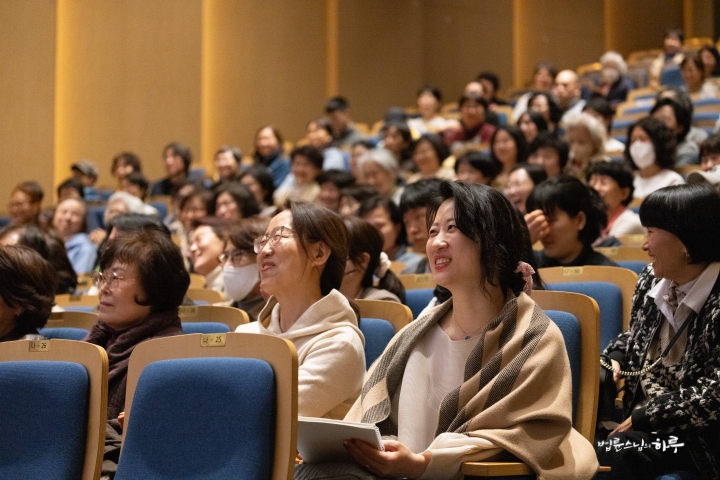
For the past few days, the forest fires have become increasingly serious, so JTS urgently dispatched an emergency relief team yesterday. While surveying the affected areas, we provided immediate support for essential items needed by victims and firefighters, and also assessed how we could offer further assistance. Yesterday, we provided supplies to the affected areas in North Gyeongsang Province. Today, we supported firefighters in the Sanchung area. As the JTS emergency relief team identifies necessary items during their assessment, Jungto Society members are purchasing and providing these supplies. The challenge ahead is recovery. There’s much work to be done together as a nation, including housing reconstruction and forest restoration. While the government will take the lead, I hope all citizens will participate in the recovery efforts.”
Sunim then recited the Haetaljoo (Liberation Prayer) for those who lost their lives in the forest fires before beginning the Dharma Q&A.
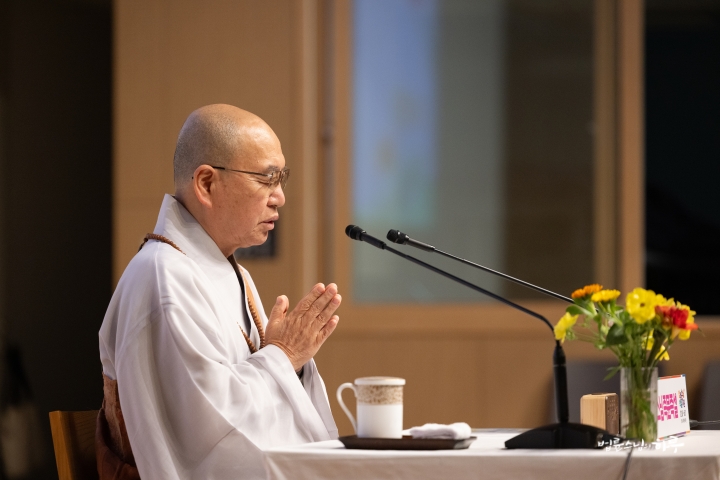
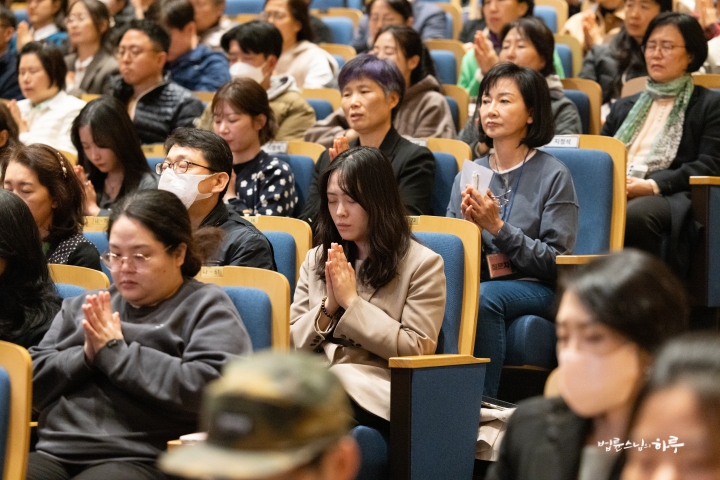
Following this, anyone could raise their hand to ask Sunim questions. During the 90-minute session, six people had conversations with Sunim. One woman sought Sunim’s advice about her husband who had fallen victim to a phone scam, incurring significant debt, and now spent his time drinking and staring at his phone, which made her increasingly angry.
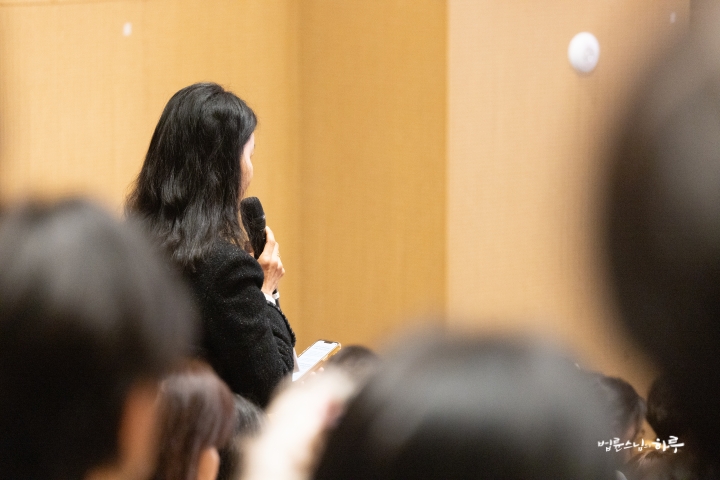
My Husband Incurred Huge Debt from a Phone Scam
“In life, we sometimes face unexpected situations. Those who lost their homes and families in the recent North Gyeongsang Province forest fires couldn’t have imagined such a tragedy just days before it happened. Yet it occurred. This is life. Compared to the forest fire victims who lost their homes and loved ones, the phone scam resulted in financial loss, but fortunately, no one was physically harmed. In such situations, it’s important to maintain the perspective that ‘At least no one was hurt, which is fortunate.’ If your husband is suffering because of this incident, you might comfort him by saying, ‘Dear, wealth comes and goes. It’s regrettable, but what can we do about something that has already happened?’
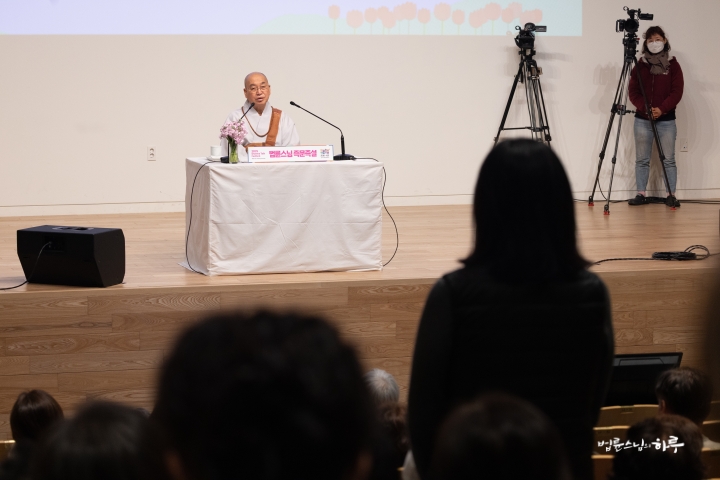
If there’s a possibility of recovering the money, you should pursue it through legal channels. However, if recovery is impossible, it’s best to forget about it and move on, as further efforts would be fruitless. You might encourage your husband by saying, ‘When we were newlyweds, we managed without much. Now we just lack money, but you have business skills and connections, so we’ll be fine. Don’t worry too much.’
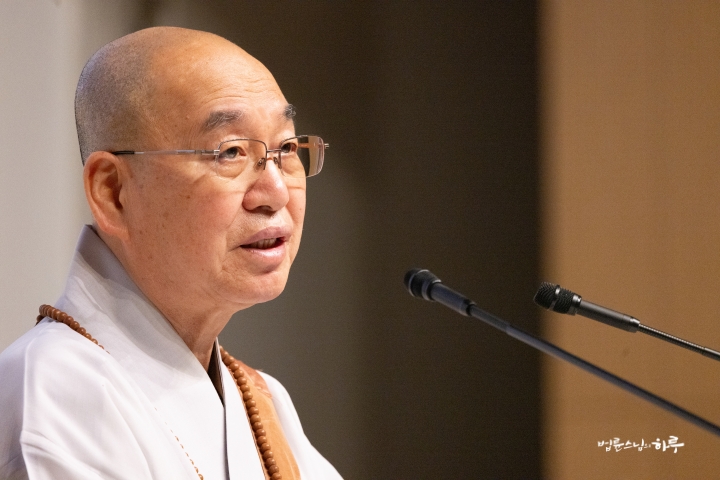
It’s natural to feel anxious about your husband’s business. The economy isn’t doing well these days, with even large conglomerates reportedly struggling. Many predict things will get more difficult in the coming years. The world is changing rapidly. In this circumstance, your husband’s small business is even more vulnerable. At times like this, you need to clarify your own perspective. If you’re truly uncomfortable with the uncertainty of your husband’s business, you can make a suggestion to him.
“Honey, during this economic downturn, let’s consider closing the business, being frugal with our savings, and earning a living through wage labor until the economy improves. Then we can look for new opportunities.”
This is one approach – discussing it with your husband and resolving the situation. If he won’t listen no matter how much you talk, you have two options. First, you could end your relationship with your husband.
“If I stay with this man, I feel we’ll end up broke. Perhaps it’s better to divorce now. If the business fails, it would be better if he fails alone rather than dragging me down with him.”
If that’s how you feel, you can end the relationship. If not, the second option is to support your husband.
“My husband is hardworking and a decent person. His business might not necessarily fail. Even if it does, I’ll support him wholeheartedly. I can earn the living expenses. If we go broke, we can always start over.”
If that’s how you feel, try supporting your husband. From what you’ve said, it seems you’ve already hit rock bottom, so there’s not much more to worry about. If you have nothing hidden away, what is there to fear? It’s a sin to hide money and not pay debts, but it’s not a sin if you can’t pay because you don’t have money. If the only way to pay your debts is to die, then you simply can’t pay – what else can you do?
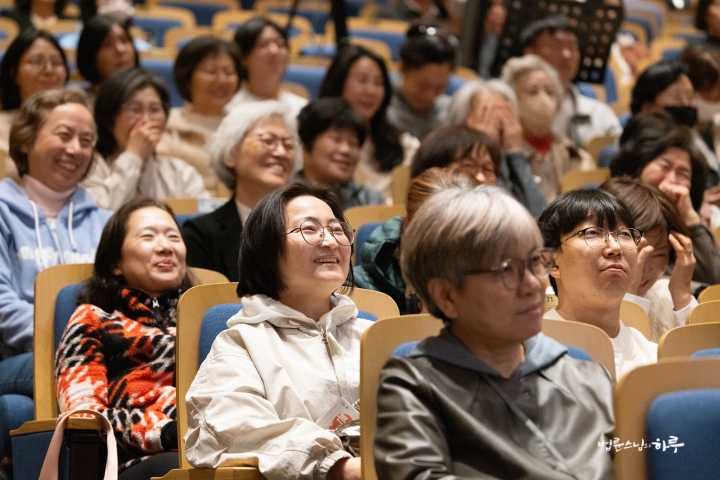
I understand that it’s a situation worth worrying about. However, worrying doesn’t solve the problem. Worrying is just wasting energy on something useless. If you want to waste energy, you can, but since it doesn’t help you at all, it’s better to let go of your worries.
Why not be more understanding about your husband drinking at home and looking at his phone? At least he only lost money; fortunately, no one was hurt. He’s not causing a scene threatening suicide, and he’s still working diligently. Thinking, ‘How dare he just drink and look at his phone at home after losing all that money’ only makes you tired. Right now, your husband is trying to forget his pain by drinking and using his phone. When people lose a large sum of money, they always think about getting it back. Because of this psychology, if someone dangles bait that promises a large sum of money, your husband might fall victim to another scam. When your husband is in this psychologically vulnerable state, you need to help stabilize his emotions to reduce the risk of it happening again.
But many of you think the opposite. You think, ‘My husband lost the money, so he should comfort me, not the other way around.’ However, the person who lost the money is naturally more anxious and distressed. So if you want to continue living with your husband, don’t be too critical. Instead, try to understand: ‘From my husband’s perspective, he must feel terrible for being fooled.’ It’s better to comfort your husband. Of course, if you don’t want to stay together, you can say, ‘I can’t live with a fool like you. Couldn’t you find a better place to throw away money?’ and then separate.”
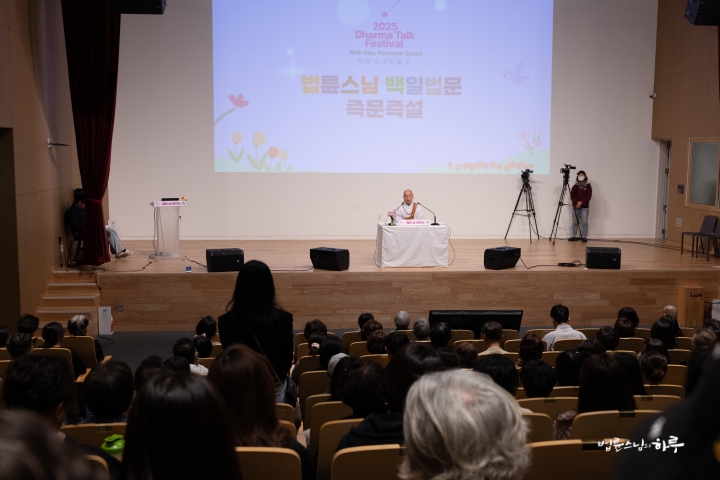
“I borrowed money from both my parents and in-laws, and now I’m too ashamed to face them. My confidence is so low that it’s difficult to visit them. What should I do?”
“That’s precisely what filial impiety is. You’re thinking about this backward. Because you borrowed money, you should visit them more often. You should sweep their room, massage their backs, and apologize by saying ‘I’m sorry.’ That way, even if you can’t repay the money later, they’ll be less resentful. If you just borrow money and never show your face, your parents will likely feel more resentful. Fundamentally, parents don’t hate their children. They might nag a little, though. So visit them more frequently, and even if you can’t repay the money, show them your sincerity by saying, ‘I’ll at least offer you my devotion.’ That’s what you need to do.”
“Thank you. I understand now.”
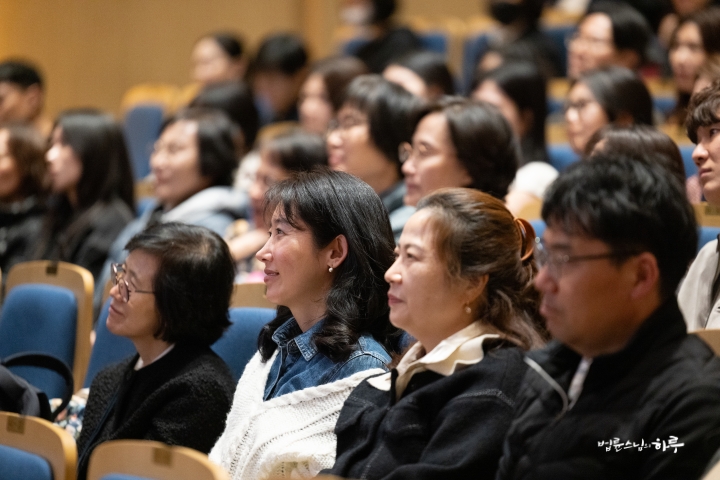
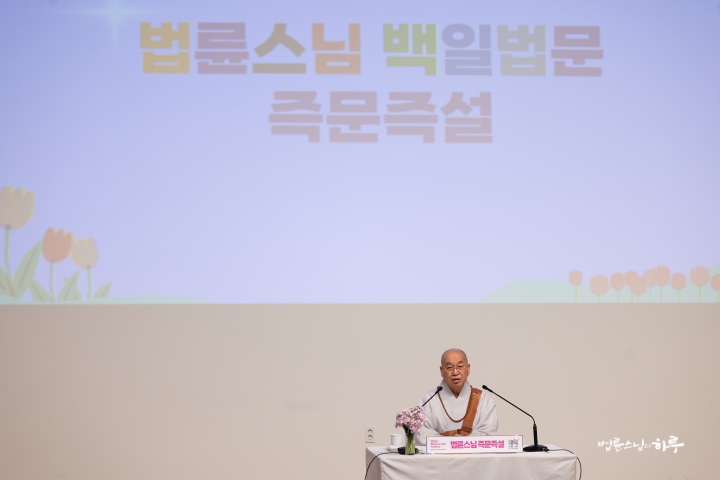
“All of you should be careful when someone asks to borrow money from now on. When you lend money, it often creates a situation where you can’t face each other anymore. You lose both the money and the person. That’s why you should never lend money to friends, relatives, or close acquaintances. It’s better to be criticized instead. I’m not saying don’t give money. I’m saying don’t lend it. If you’re going to lend it, it’s better to just give it away. When you lend money, there’s a high possibility that you’ll become enemies. Human psychology works that way. It’s not because people are bad, but because of how our psychology functions—you end up losing both money and relationships.”
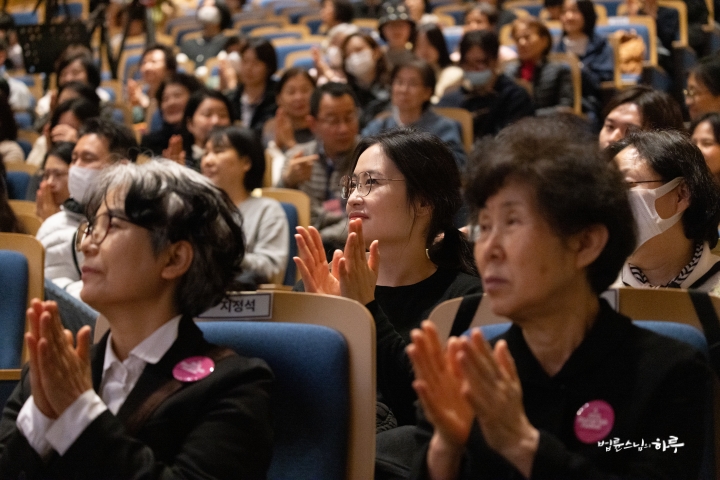
The questions continued to flow.
Many people raised their hands wanting to ask questions, but since it was almost noon, Sunim concluded the lecture, noting that unanswered questions would be addressed in the evening session.

After having lunch with the Sangha in the dining hall on the first basement level, Sunim spent the afternoon working in his office.
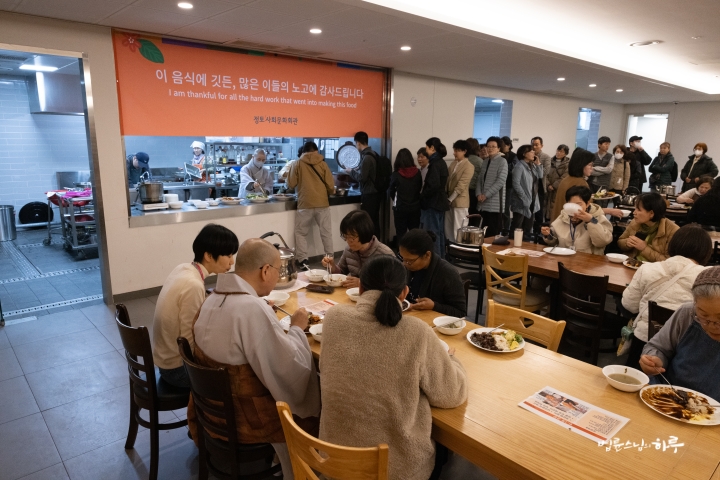

As the sun set, at 7:30 PM, Sunim continued with the Friday Dharma Q&A session in the main hall in the basement. Many citizens came to the Jungto Social and Cultural Center to attend. They registered on-site or submitted their questions before heading to the basement hall with light steps.

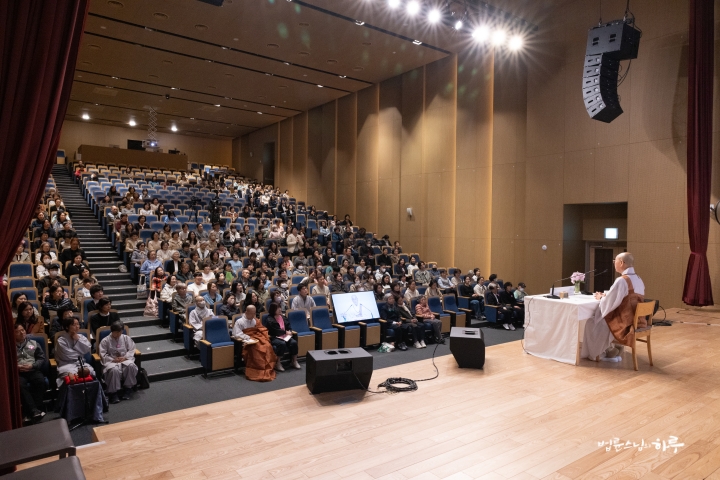
The Friday Dharma Q&A session began with about 5,400 people connected via YouTube and around 160 people present at the venue. After reciting the Three Refuges and Words for Practice, Sunim took his place on the stage.
Over the course of an hour and a half, six people raised their hands to engage in conversation with Sunim. One person sought advice about her role as an intermediary between her husband and child, as her husband’s one-sided scolding had created a poor relationship between them.
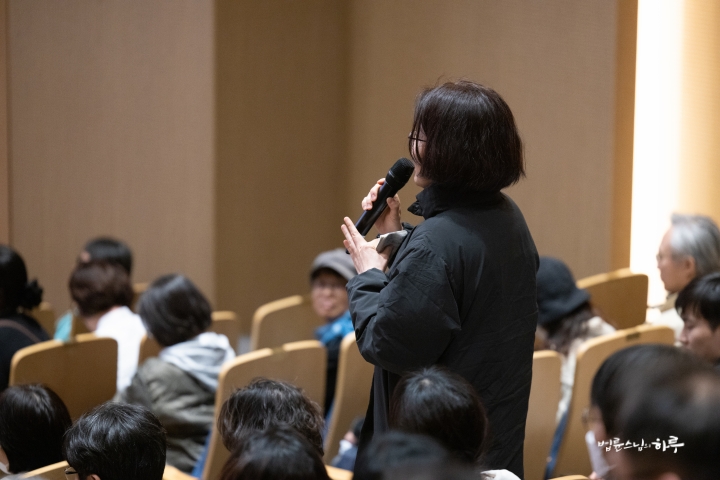
My Child and Husband Don’t Get Along, What Should I Do in the Middle?
“That’s not just observing. You’re not taking a neutral stance. You’re not intervening and arguing, but you’re still involved in the conflict from your child’s perspective. Of course, there are times when you shouldn’t just stand by and watch. You shouldn’t just observe crimes. First, assault must be reported. Whether a child hits their father or a father hits their child, this constitutes a crime. As a citizen, you must uphold the law and report it to the police for the sake of social justice. Second, you shouldn’t just observe sexual harassment. If a father sexually harasses his daughter and she expresses distress, you shouldn’t turn away saying it’s between her and her father.
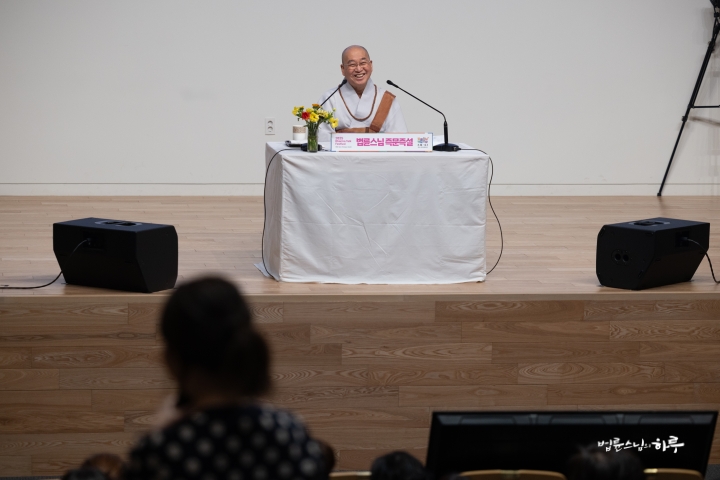
If your child has gone to college, they are an adult. Naturally, from a father’s perspective, when his child sleeps in late while living off money the father earned instead of going out and getting a part-time job, he’s going to scold them. If you step in and tell your husband not to reprimand the child, it hurts your husband’s pride. From the child’s perspective, when mom takes their side, it only confirms that dad is wrong. As a result, the child grows to resent their father. So you shouldn’t defend the child.
If your child has mental health issues, that’s a different matter. You should have them diagnosed at a hospital, and if a condition is confirmed, you should talk to your husband about treating the child as a patient who needs care. If that’s not the case, there’s no need to get involved. It’s fine if they argue with each other. While you may not be directly intervening verbally, you’re still emotionally involved in their conflict.”
“That’s right.”
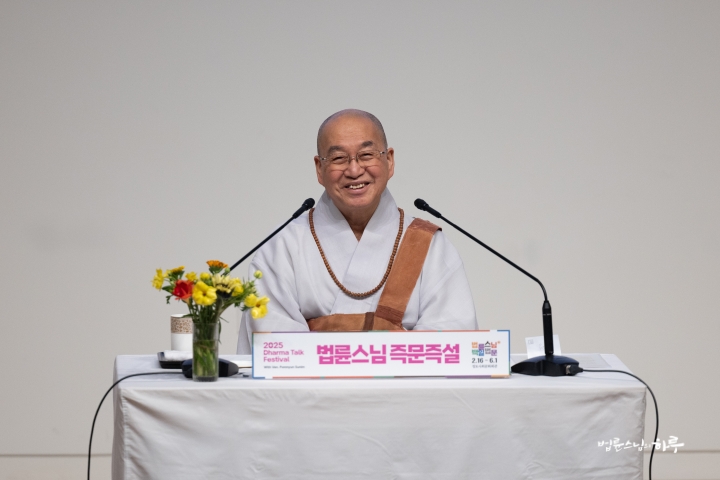
“Of course I’m right. Would I say something wrong? (Laughs) If your child complains, ‘Why don’t you take my side, Mom?’ you can humorously respond, ‘You should be grateful I’m not taking your father’s side.’ What has your child done right? Nothing. They’re staying at home because they don’t want to spend their own money, and they’re not studying either. Who wouldn’t scold them? But if you scold them just like your husband does, your child will be hurt. On the other hand, taking your child’s side won’t solve the problem either. That’s why I’m saying don’t get involved. Just observe. Your child is now an adult, so you no longer need to take sides. The problem remains unresolved because you’re mentally taking your child’s side.”
“I understand this intellectually, but I can’t seem to do it in reality.”
“If you understand it intellectually but can’t apply it in reality, then you’ll have to endure the painful consequences.”
“I’ll try again.”
“There’s no right or wrong here. You need to observe this situation as a third party. Remove the ‘my’ from ‘my son’ and ‘my husband’ and just see it as an issue between a father and son. Don’t get involved. Let them resolve it themselves. If your child complains, ‘Why don’t you take my side, Mom?’ you can humorously respond, ‘I wanted to take your father’s side, but I held back because I was worried you’d get hurt. Remember, your father and I met first, which is why you’re in this world.'”
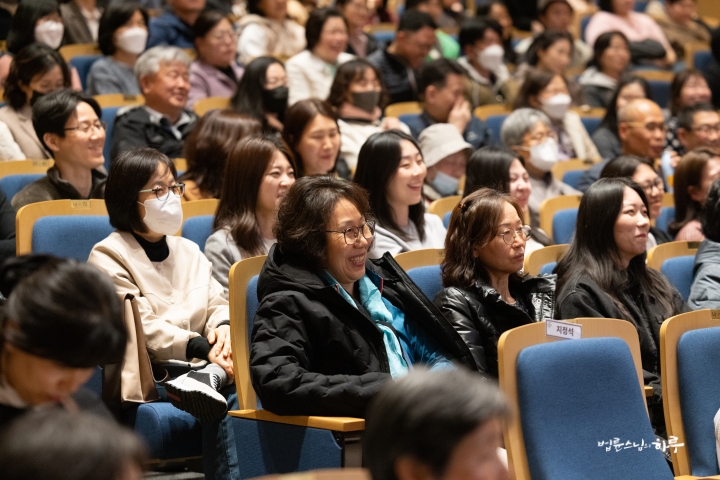
“When my child tries to take initiative on something, my husband forcefully stops him. My child is interested in Japanese, even though it’s unrelated to his major, and wants to work part-time to save money to live in Japan for a few months. But my husband says, ‘How will Japanese help you? Study English instead,’ and speaks very forcefully. Although my child is an adult, my husband seems to be more authoritarian because he’s supporting his tuition.”
“When children are under twenty, it might seem a bit petty for parents to use money to threaten them. But once children become adults, it’s a parent’s legitimate right to use money as leverage. If Sunim gave a scholarship to a student who then decided to go to Japan instead of attending school, would Sunim continue or cut off the scholarship? Obviously, Sunim would cut it off. In such cases, arguments like ‘How can a father treat his child so unfairly?’ don’t hold water. Your husband must have shown this kind of strength of character when you fell in love with him, right? Now you’re experiencing the consequences of that.” (Laughs)
“How did you know my husband has a strong character?”
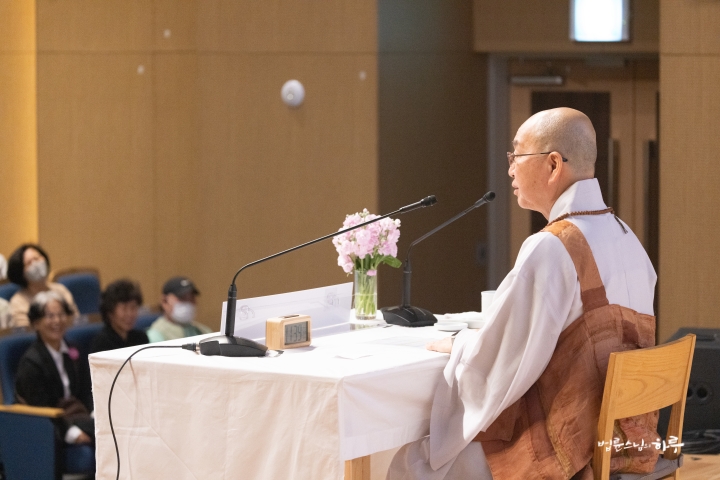
“How could I do Dharma Q&A if I didn’t know such things? (Laughs) This is a clash of karma between the two of them, so just leave them be. Never tell your child, ‘Your father is wrong, so you should just put up with it.’ Instead, just buy them a meal, pat them on the back, and say with a smile, ‘I told you not to move back home, so why did you?’
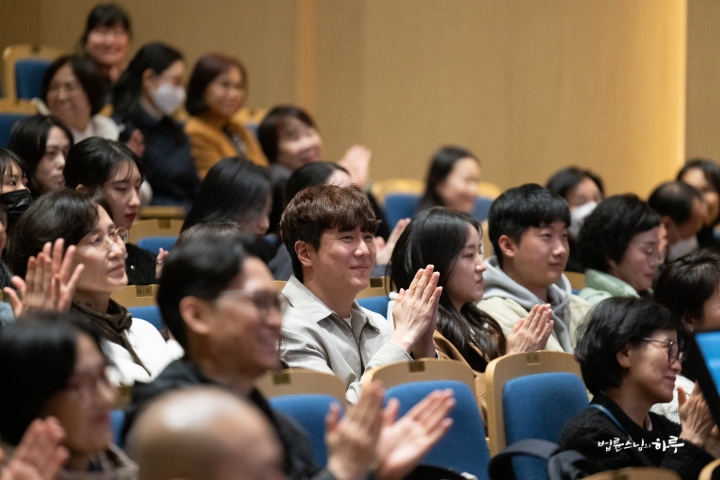
‘If you get free meals, you have to take some scolding too. That’s the way of nature. Your room is free, your laundry is free, your food is free—it’s impossible not to get scolded. Living at home for free means you have to listen to your father’s nagging and be treated like a child sometimes. That’s how the world works. If you can accept that, stay at home. If not, live on your own.’
You can talk to them humorously like this. It’s not your place to tell them how to resolve their relationship. If you make a mistake, both your husband and son will be upset with you. If you try to comfort your child by speaking ill of your husband, and those words get back to your husband, you’ll end up fighting with him too. Many people fight with their spouses with their children caught in the middle. They think they’re being smart, but it’s actually the most foolish thing to do.”
“Yes. Thank you. I understand now.”
The questions continued one after another.
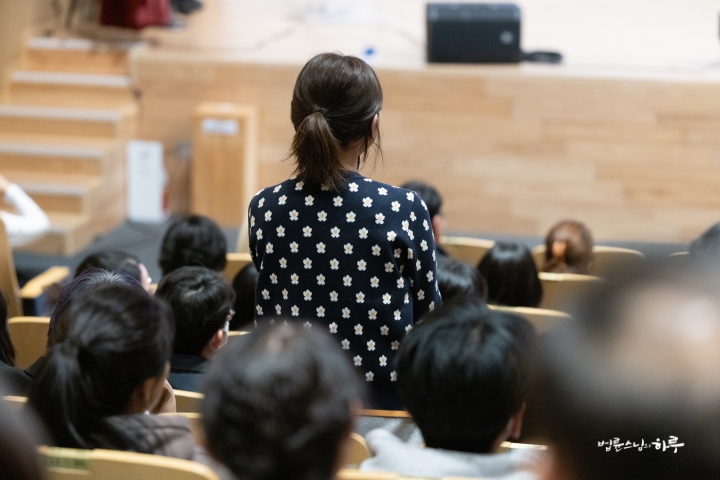
I understand that death is part of life, but when a family member is sick or has little time left, I find myself falling into distress without realizing it. Can one become free from the fear of death as one’s practice deepens?
While I dislike my husband, there are moments when I find myself liking him. It’s difficult to maintain emotional balance, and my feelings fluctuate greatly. How can I cultivate equanimity?
When I make choices, I don’t feel completely satisfied and always have lingering doubts. I hesitate a lot before making decisions and have many fears and worries, which troubles me.
My child, a medical student, will fail the year if they don’t attend classes by early April, but they don’t seem concerned about failing. As a parent, what mindset should I have in this situation?
It was past 9 PM by the time the conversation ended.
Sunim immediately departed from Seoul and headed to Dubuk Jungto Retreat Center.

For the next two days over the weekend, Sunim plans to plant trees and do farm work with male lay practitioners at Dubuk Jungto Retreat Center.




